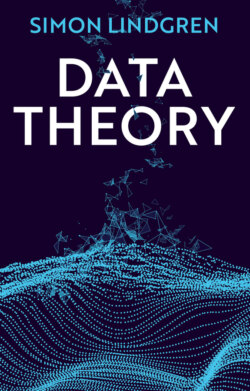Data Theory

Реклама. ООО «ЛитРес», ИНН: 7719571260.
Оглавление
Simon Lindgren. Data Theory
Contents
Guide
Pages
Data Theory. Interpretive Sociology and Computational Methods
Copyright page
Introduction: Data/Theory
Outline of this book
1 Beyond Method
Datafication
Data theory
Verstehen and Evidenz
Theories old and new
A bit of anarchy
Data piñata
Breaking things to move forward
A patchwork of solutions
The interpretive interface
Instruments of revelation
2 Decoding Social Forms
The odd places of politics
Social media politics for better or for worse
Virality and memes
The Weber connection: Ambivalence and trolling as ideal types
The Durkheim connection: Society > the sum of its parts
The Simmel connection: Social forms
Social cryptography
3 Unintended Consequences
The thumb-typing leader of the free world
Unpacking ambivalence
Error
L’affaire covfefe
Social media backfire
4 Actor-Networks
A sociology of translation
Finding the actors
Making connections
Who owns theory?
5 Collective Representations
Words and the company they keep
Learning from afar
Reading Reddit
Mapping the language of Reddit
Nodes and chains
6 Symbolic Power
Social fields
Capital and habitus
Adapting Bourdieu’s capital forms to social media data
A social space of political tweets
7 Theoretical I/O
Gaining theoretical sensitivity
Data science as ethnography
Conclusion: Theory/Data
Brutalising theory
Notes on ethics
Final remarks
References
Index
POLITY END USER LICENSE AGREEMENT
Отрывок из книги
Simon Lindgren
In the face of the availability of new types of digital research data, and the contemporary popularity of computational methods in an increasing range of scholarly fields, the book should be read as an explorative attempt to make synergetic gains by harnessing the respective powers of interpretive social analysis and computational methods within one and the same research framework. This is not to say that the proposed hybrid approach must replace any other existing approach, but I want to explore potential points of contact between some concepts and strategies that are not regularly combined.
.....
This book does not swear by the entire philosophy of Feyerabend, but it does align with his idea that it is good for science if we violate some of its rules every now and then. It might be a way to move forward. This is therefore neither a book about true data science nor about dogmatic sociology (whatever those might be). It demands that the reader keep an open mind in relation to the transcending character of the presented analytical approach.
As argued above, theory needs data. But this book is not about data science being told correctly by sociology. It is just as much the other way around. And maybe not so much telling as mutual learning. Throughout the central parts of this book, we shall look at how knowledge about some particular data can be advanced through some particular social theory. I will also discuss how theory can advance the formulation of the methodology by which we approach the data. The overarching goal is the productive meeting of the two.
.....